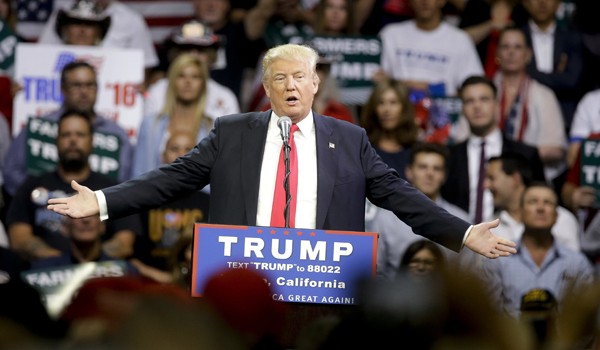
A Warning on the Trump Phenomenon
How has Trump — representing whites, males, conservatives, and the traditional puritan brand and positions — become such a sweeping, irresistible force? Foreign media has followed a similar exceptional phenomenon, noting earlier the “Trump of the Philippines,” Rodrigo Duterte, who in the beginning of May had already been easily elected as the newly appointed president of the Philippines. As for the second round of voting for Austria’s president next week, if it were not for the surprising victory of Green Party supporters, we would have had the “Trump of Europe,” the extreme right-wing candidate Norbert Hofer in power, who would undoubtedly have made reaching a consensus on the EU refugee policy more difficult.
Facing this globalized trend of “Trumpism” spanning across various countries, mainstream international opinion attributes it to the rise of social media, as well as to these political leaders being well versed in the major transformations occurring in traditional media. Consequently, it’s been one populist appeal after another, a trend toying with public sentiment, a weapon used mistakenly to pillage the authority of government and the scope of its influence, and also to spur changes in policy stance in every country, apparently an indication of a collective move toward radical extremism.
I fear these ways of perceiving the problem are both correct and incorrect. This phenomenon may be showing one side of the coin without the other. Newly developed social media is passed through a powerful filter, breaking past the boundaries of elite and regular people, bringing about everybody’s right to free speech, and indeed toppling long established power relations. However, this merely touches on the vehicle of dissemination — the environment of social media and the efficiency of its dissemination. The existing plight of globalization is that there are many large, discontented societal conditions that cannot be ignored, but which have universally gone without any effective handling or solution. If government elites are unable to deeply grasp this point, which becomes increasingly diverse day by day, and provide an effective response, it will become a tool that magnifies every small event and thus in return will add excessive variables and difficulty to rational policy making.
The Trump phenomenon, as far as Taiwan is concerned, is in hindsight actually not strange at all, since as early as 2015 Taiwan detonated the “Commenter Revolution” that represented the deconstruction of media and government. That year, a relatively unknown figure defeated an establishment candidate in the election for Taipei mayor. The sudden rise of Ko Wen-je is due, in general, to his agenda and style having obtained the online advantage. Furthermore, what follows extends to constituencies all over the world. The regional territories won by the DPP for the first time surpassed the KMT, who have held a dominant one party rule for 60 years.* In the 2016 presidential election, a KMT presidential candidate was so looked down upon that the DPP candidate was actually described as “winning while lying down.” A great disparity was clearly visible.
Due to a series of preceding steps Taiwan is now facing a time of many changes and needs to have an even more forward-thinking vision to succeed. For example, there’s already not much significance in guessing whether Trump will really be elected or not. The real concern is whether Trump is a person who can or cannot skillfully rule the country, and who is qualified to bring stability to the international order. In the same way, when people in Taiwan see Mayor Ko return to the “world of mortals” to face the harsh challenges of municipal government, they will inevitably make demands of Tsai Ing-wen’s newly appointed government.** Tsai will need to learn from her predecessor’s past mistakes, and gain experience and knowledge to avoid repeating similar kinds of disastrous policies.
As the new government comes to power in ten days, the visions of all sides must be cast without exception, as there are keen expectations and incisiveness involved.
After voters have — with great difficulty — unseated the powers that have held office for the last eight years, what is the path forward? If the government, supported by the discontented in society or by those who retaliate against arrogant elites, cannot govern effectively or expand a dialogue with the people, won’t this quickly overflow and backfire?
In the last few days, the Tsai government could use feedback to come to some understanding of public opinion. If the Tsai administration’s accomplishments do not live up to Ma Ying-Jeou’s, then being overly cautious would be not only impractical, but also conservative; for example, when the head of the World Health Assembly intentionally omitted Taiwan in a public speech, it inevitably lead to a loss of credibility for the Tsai government. In another example, the government did not give public notice, or carelessly made an announcement, about a new highway fee that charges people who use the highway. However, because the government did not give proper notice to the public, this led to an online outcry. The original intent of the government thus turned out to be a thoughtless effort in the beginning, cowardly later on, and ended up costing the government credibility.
From these measures, we can see that everyone wants democracy, not populism, and they want progress, not regression. To grasp the know-how needed, we must return to reasonable evaluations and procedural justice. Thus, after the fervor settles, the political truth will come to light. After we observe the Trump phenomenon, we should make it a personal reminder and a reference.
*Editor’s note: The DPP and the KMT, the Democratic Progressive Party and the Kuomintang of China, respectively, are the two major political parties of Taiwan.
**Editor’s note: Tsai Ing-wen is a Taiwanese politician currently serving as the President of the Republic of China. Tsai is the first woman elected to the office.

